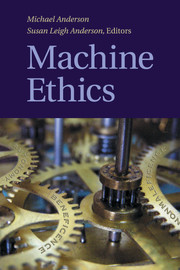Book contents
- Frontmatter
- Contents
- General Introduction
- PART I THE NATURE OF MACHINE ETHICS
- PART II THE IMPORTANCE OF MACHINE ETHICS
- PART III ISSUES CONCERNING MACHINE ETHICS
- Introduction
- 6 What Matters to a Machine?
- 7 Machine Ethics and the Idea of a More-Than-Human Moral World
- 8 On Computable Morality
- 9 When Is a Robot a Moral Agent?
- 10 Philosophical Concerns with Machine Ethics
- 11 Computer Systems
- 12 On the Morality of Artificial Agents
- 13 Legal Rights for Machines
- PART IV APPROACHES TO MACHINE ETHICS
- PART V VISIONS FOR MACHINE ETHICS
- References
11 - Computer Systems
Moral Entities but Not Moral Agents
from PART III - ISSUES CONCERNING MACHINE ETHICS
Published online by Cambridge University Press: 01 June 2011
- Frontmatter
- Contents
- General Introduction
- PART I THE NATURE OF MACHINE ETHICS
- PART II THE IMPORTANCE OF MACHINE ETHICS
- PART III ISSUES CONCERNING MACHINE ETHICS
- Introduction
- 6 What Matters to a Machine?
- 7 Machine Ethics and the Idea of a More-Than-Human Moral World
- 8 On Computable Morality
- 9 When Is a Robot a Moral Agent?
- 10 Philosophical Concerns with Machine Ethics
- 11 Computer Systems
- 12 On the Morality of Artificial Agents
- 13 Legal Rights for Machines
- PART IV APPROACHES TO MACHINE ETHICS
- PART V VISIONS FOR MACHINE ETHICS
- References
Summary
Introduction
In this paper i will argue that computer systems are moral entities but not, alone, moral agents. In making this argument I will navigate through a complex set of issues much debated by scholars of artificial intelligence, cognitive science, and computer ethics. My claim is that those who argue for the moral agency (or potential moral agency) of computers are right in recognizing the moral importance of computers, but they go wrong in viewing computer systems as independent, autonomous moral agents. Computer systems have meaning and significance only in relation to human beings; they are components in socio-technical systems. What computer systems are and what they do is intertwined with the social practices and systems of meaning of human beings. Those who argue for the moral agency (or potential moral agency) of computer systems also go wrong insofar as they overemphasize the distinctiveness of computers. Computer systems are distinctive, but they are a distinctive form of technology and have a good deal in common with other types of technology.
On the other hand, those who claim that computer systems are not (and can never be) moral agents also go wrong when they claim that computer systems are outside the domain of morality. To suppose that morality applies only to the human beings who use computer systems is a mistake.
Information
- Type
- Chapter
- Information
- Machine Ethics , pp. 168 - 183Publisher: Cambridge University PressPrint publication year: 2011
References
Accessibility standard: Unknown
Why this information is here
This section outlines the accessibility features of this content - including support for screen readers, full keyboard navigation and high-contrast display options. This may not be relevant for you.Accessibility Information
- 8
- Cited by
